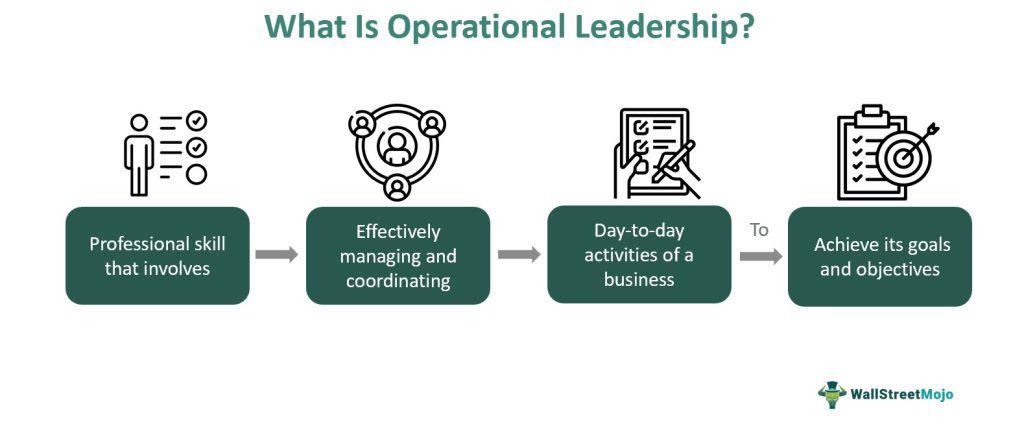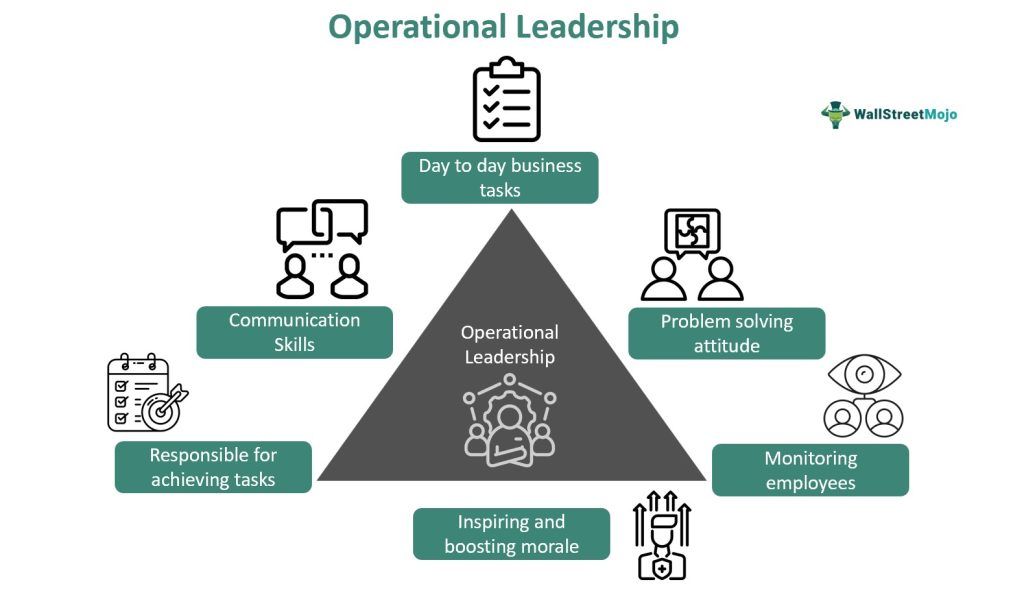Table Of Contents
What Is Operational Leadership?
Operational Leadership is a professional skill of developing, managing, strategizing, and executing business operations. It caters to all types of business operations and practices and may belong to several departments, including monitoring, guiding, and leading employees, staff, and departments together.

A company always seeks it as a critical quality in their managers and employees who are capable of taking charge of daily operations, smooth functioning, are responsible, and always looking forward to increasing efficiency, productivity, and profitability of the organization. A manager with operational leadership is bound to have communication, analytical, critical thinking, and problem-solving skills.
Key Takeaways
- Operational leadership definition refers to the qualities of handling day-to-day business operations, including initializing, strategizing, managing, and overseeing every operation and business activity with full accountability.
- Companies are in constant search of this skill in their employees and managers to lead, guide, and oversee teams and concentrate on maximizing productivity and efficiency.
- Some companies train people under their internally designed operational leadership programs to make them fit for future roles and designations.
- Without operational leaders, a company may lack productivity, lag in work, and will only work sub optimally.
Operational Leadership Explained
Operational leadership is a work characteristic that is required of individuals to take care of and ensure the accomplishment of day-to-day business operations and activities. In any company, when a team is assigned work, task, or project, whether it is reporting, manufacturing, supply chain, or service deliverance, it includes multiple processes, efforts, work, analysis, and overall management.

It is where this skill comes into play. In most facilities, offices, and workplace environments, there are one or multiple assigned individuals who are responsible for managing, guiding, helping, motivating, and monitoring work and progress. It also includes overseeing employees and team members.
It is one of the most crucial professional qualities that they seek in people while recruiting. An operational leader always has multiple tasks in hand. Some of the core responsibilities are inventory management, technology management, financial and production management, including compliance, risk management, planning, execution, data analysis, and reporting. At the same time, the essential skills required are that the individual should be tech savvy, work with coordination, have people skills, and have good organizational abilities and management knowledge.
There are many operational leadership programs available that train employees and staff to become agile towards work, identify errors and human errors, utilize the workforce and resources optimally, and employ its principles to maximize productivity, efficiency, and profitability. In the modern corporate world, companies train and hire multiple operational leaders at work.
Examples
Below are two examples; the first is hypothetical, and the other is from real-world news to understand the concept in a better way-
Example #1
Suppose James owns a small grocery shop in the local market of his village. With time, effort, and business tactics, his business grows, and he decides to expand his shop to a full-fledged store, including more and more products and goods for customers. It includes hiring new staff and employees at the store. James' store became an instant success, and within the next two years, he decided to open another store, but he couldn't handle only one store at a time.
James hires Jennifer as his second store manager. Jennifer looks after everything from start to finish in the second store. She looks after the daily operations and overseas staff, manages and strategies the whole store, and is responsible for every single execution that takes place in it. In times when there is a massive crowd at the store, Jennifer attends to customers and looks after the billing counter, inventory, finance, and expenses. In this example, it was evident that Jennifer has good people skills, communication skills, social skills, critical thinking skills, problem-solving skills, and management skills. Jennifer showcases operational leadership skills as a whole and is excellent at it.
Example #2
In May 2023, Starpower announced new operational leadership positions given to their booming growth and expanding businesses. The company came up with new roles, especially in the sales organizational structure, to encourage and promote the company's operation growth and expansion. The four leading positions are one of Sales Operations Manager, two General Showroom Managers, and one Brand Ambassador.
The Director of Sales claimed that they are excited to expand operations and are working to attain gender diversity by increasing women in technical and leadership ranks. Starpower Home Entertainment Systems, Inc. was founded in 1995 and is a family-owned business operated by the Pidgeon brothers. The company is renowned for offering high-end, custom installations of appliances and audio, video, electronic, and security automation. Moreover, the company is one of the only customer retailers to have an in-house custom installation team in the country.
Importance
The importance of operational leadership is -
- It helps managers influence and motivate their employees and teams to grow in different areas of work, ultimately maximizing productivity.
- An operational manager is often responsible for making core and critical business, management, operational, and strategic decisions.
- An individual with operational leadership always sets clear targets and organizational goals and is inclined to achieve them.
- With this skill, better customer satisfaction, organizational understanding, and internal and external growth are accomplished.
- An operational manager is always adaptive to change, inspires hard work, uses clear communication, and monitors the progress and performance of tasks, projects, and teams as a whole.
Operational Leadership vs Strategic Leadership vs Tactical Leadership
The critical differences between operational, strategic, and tactical leadership are -
- Operational leadership is defined as a skill in managers who look after the day-to-day activities and business operations. Strategic leadership is a skill more concerned with planning and developing a blueprint to follow in processes. Still, tactical leadership revolves around making things ready and becoming ready and prepared for operations and tasks.
- Operational leaders seek to reduce costs and maximize production time. In comparison, strategic leaders are into the strategizing process and achieve goals, but tactical leaders know what should be done, who should be called, and the required tactics to accomplish tasks.
- In a nutshell, operational leadership is monitoring processes and overseeing employees and systems, but strategic leadership starts before the process and production to shape the entire planning. At last, tactical leadership involves using the right tools and systems to achieve goals and objectives.
